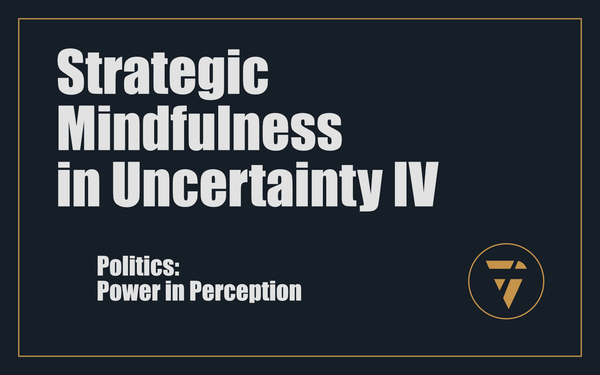Canada’s Last Advantage

Community as the System That Outlasts Capital, Technology, and Drift
The world is splintered. Supply chains buckle under pressure. Capital pools, but doesn't flow. Nations drift between identity and ideology. Technology sprints ahead while governance crawls. The common person feels the strain in every grocery bill, every rent cheque, every moment of uncertainty about whether their children will have more, or less.
Canada is not immune. Our image of calm civility masks a deeper fracture: housing that locks out generations, businesses starved of capital, communities that no longer feel like communities. For decades we’ve relied on our natural resources, our geography, and our reputation to buy us time. That time has run out.
This is the moment. Not a soft suggestion. Not an abstract possibility. A hard, present moment that requires building, buying, and anchoring with consequence.
Because if we don’t build, we will be bought. If we don’t own, we will rent our future. If we don’t act, drift will hollow us out until Canada is no longer sovereign society, but merely a marketplace for others’ empires.
HOUSING: THE FOUNDATION OF COMMUNITY
Let’s start where the fracture is most visible: homes.
Housing in Canada has shifted from being shelter to being speculation. Families are displaced not because they lack work ethic, but because the market was allowed to become a game of extraction. Seniors, after a lifetime of contribution, are forced into isolation because age-friendly, community-integrated housing is rare.
We must reject the idea that homes are commodities first. They are the infrastructure of society. Every child deserves a stable roof, every elder deserves a dignified place to age, and every worker deserves to live near where they contribute.
The lever is this: build homes as systems, not just as units. Age-friendly, climate-secure, integrated with community services and local businesses. Homes that create neighbourhoods, not just developments. If Canada can't house its people, it cannot hold its future.
BUSINESS: THE ENGINE OF COMMUNITY
Next: businesses.
For too long, we have tolerated a model where business means extraction. Maximise shareholder return, minimise everything else. The result? A hollowing of trust, and a widening gap between owners and workers.
Canada does not need more corporations stripping value. We need businesses that embed community. This is where profit matters. It's not charity. It's not redistribution. It is the structural commitment that profits flow equitably to all stakeholders — executives, employees, partners, and communities.
This is not utopian. It's structural. Shared profit breeds shared loyalty. Transparency builds trust. And trust is the most valuable currency in a fractured age.
The lever is this: buy businesses not just for margin, but for their ability to anchor community. Keep them Canadian. Restructure them with for real growth. Turn them into engines of expansion, not extraction.
FUNDING: THE OXYGEN OF GROWTH
Now, the hard truth. Every builder, every operator, every founder knows: without capital, vision suffocates.
Our traditional funding systems are too slow, too narrow, too cautious. Banks protect themselves. Venture capital hunts unicorns, not communities. This is why Canada loses innovators. They move to ecosystems where capital flows faster.
The future belongs to funding innovation. Crowdfunding, peer-to-peer lending, revenue-based financing, tokenized assets. This is not gambling with crypto. This is democratizing access to capital, so builders can move at the speed of their vision.
Capital must circulate, not pool. Communities must invest in themselves, not wait for permission from institutions.
The lever is this: install capital systems that match the speed of ambition. Because capital is not money. Capital is time, compressed. And the nation that compresses fastest wins.
LEVERAGE: THE LAW BEHIND EVERYTHING
Effort is not enough. Hustle is not enough. Productivity hacks are not enough.
What Canada lacks is leverage. Strategic, operational, temporal, relational, financial. The invisible engines beneath scale and speed.
Without leverage, our builders burn out. Our leaders drown in meetings. Our systems decay in complexity. This is why drift dominates our institutions. We confuse motion with progress.
The lever is this: replace effort with compression. Replace advice with systems. Replace consultants with operators. Every cycle wasted is capacity lost. Every delay compounds decay.
Canada does not need more effort. It needs more compression.
ORDER: REPLACING DRIFT WITH SYSTEMS
The era of consultants writing whitepapers is over. Advice no longer holds yield. Insight is free, but installation is rare.
Canada needs operators. Builders who install systems that delete drift. Every week wasted in committee is opportunity gone. Every policy delayed is sovereignty eroded.
The lever is this: measure leadership not by what it promises, but by what it deletes. Complexity, cost, time. A government that cannot compress is a government that decays. A business that cannot compress is a business that dies.
COMMUNITY: THE TRUE INFRASTRUCTURE
Housing. Business. Funding. Leverage. Order. All of these are systems. But the system they must serve is community.
Community is not a marketing slogan. It's not a Facebook group. It's not a hashtag.
Community is the architecture of belonging. It's the bond that makes people fight for something larger than themselves. It's the infrastructure that ensures prosperity is not fragile, but durable.
Canada’s strength has always been its community. Shared responsibility. Shared benefit. But drift has corroded that. Loneliness rises. Division deepens. Trust erodes.
The lever is this: rebuild community not as sentiment, but as system. Age-friendly housing. Funding innovation. Leverage. Order. These are not abstract. They are concrete levers of belonging.
THE COST OF INACTION
If we fail to build, we will watch ownership pass to foreign buyers while Canadians rent their own land.
If we fail to buy, we will see our businesses hollowed, their decisions made elsewhere, their profits extracted.
If we fail to fund, we will lose our innovators, our builders, our entrepreneurs to other nations.
If we fail to leverage, our effort will exhaust itself against global systems that compress faster.
If we fail to install order, drift will corrode every advantage we still hold.
The cost is not slow decline. The cost is sudden irrelevance.
THE MOMENT
Here is the truth: fracture is where builders thrive.
When systems decay, there is room for new systems. When drift dominates, there is room for order. When capital is scarce, there is room for innovation. When homes are unaffordable, there is room for builders.
This is the moment for Canada. Not a decade from now. Not after another report. Now.
THE LEVER
Here's the lever, sharpened:
Build homes that are community, not commodity.
Buy businesses that are engines, not extractors.
Fund builders with speed, not permission.
Install leverage in every system.
Replace drift with order.
Anchor everything in community.
This is not theory. This is installation. This is how Canada survives fracture and secures permanence.
THE CALL
The world is splintered. Canada is brittle. But brittle doesn't mean broken. It means ready.
If you are a builder, build. If you are a buyer, buy. If you are an operator, install. If you are an investor, deploy.
Canada doesn't need another conversation. It needs consequence.
The moment is now.
This is what I’m working on. Tell me what you think, I enjoy the conversation! Subscribe and follow the work in real time.
Thanks!
B

Canada isn’t broken. It’s brittle.
If we don’t build, we’ll be bought. If we don’t own, we’ll rent our future.
PS -






